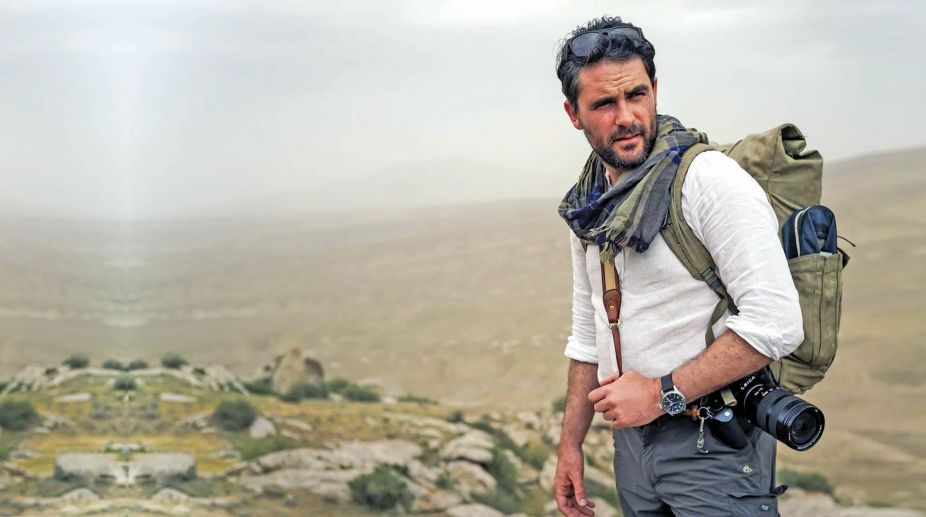A British explorer, writer and photographer, Levison Wood is famous for his walking expeditions and has already embarked on three epic treks on camera. Discovery Channel is all geared up to showcase his fourth documentary From Russia to Iran: Crossing the Wild Frontier.
In this series, Wood will begin his journey from Southern Russia, walking through the Caucasus Mountains crossing through Azerbaijan Georgia, Armenia and finally reach his destination, Iran.
Advertisement
In his earlier series Walking the Himalayas, he trekked 1,700 miles across the roof of the world. His other two series Walking the Nile and Walking the Americas received widespread praise and acclaim from critics. Excerpts from an interview:
Q. What is your daily routine like while on an expedition?
It totally depends on where we are, but usually we are up early. If we are camping, then this is usually at dawn with the first light and the sounds of the first birds waking up.
Then it’s time to make tea, have breakfast, pack up the campsite and get going. It’s rewarding to make good progress in the morning and allow plenty of time to make camp in the afternoon. It saves you wandering around in the dark looking for a place to stay.
Q. What has been your most memorable walk expedition?
Walking the Himalayas still stands out very memorable. I started in Afghanistan in the Wakhan Corridor and passed through Pakistan, India, Nepal and Bhutan.
It was fascinating to meet all the remote mountain tribes. I particularly enjoyed seeing all the pilgrims in Haridwar as they bathed on the banks of the Ganges and undertook their ritual washing. It was impressive to see how far some of the devotees had come from across the region.
Q. How is From Russia to Iran: Crossing The Wild Frontier different from your other documentaries?
This documentary has a slightly different focus, which is that I travelled in the same way that the locals do: so not just by walking, but also by bus, by car, by hitch-hiking and even sometimes by horse.
The Caucasus is a very little known region, tucked away in the mountains between east and west, and it was great to have the opportunity to show global audiences a region that is often misunderstood.
Q. Have your lifestyle and your thirst for exploration affected your personal life and relationships?
Undoubtedly it has, but luckily I have a lot of like-minded friends who enjoy a similar lifestyle and a similar type of thirst for adventure. And my parents are very patient, supportive and understanding.
Q. How has your travel experience been in India? What is unique about this country as a travel destination?
India is a really special travel destination and I’d like to spend more time there in the future. It appeals to me because it is so diverse with jungles, mountains, deserts, beaches, incredible cities and remote wildernesses, there are so many different things to do and see. It is such a storied country and it’s very easy to get around and meet people.
Q. What future expedition are you looking forward to the most? Do you think there is a chance that it might be the pinnacle of your career?
My most recent expedition was a circumnavigation of the Arabian Peninsula through 13 West Asian countries. It is a region that often suffers from misconception and is in the news for all the wrong reasons.
I wanted to show that there was more to the region than bullets and camels. I met many kind, hospitable, and inspiring people that call the region home. It was definitely my most ambitious expedition to date, who can say if it will be the pinnacle though!
Q. What has been your biggest thrill and disappointment while visiting a new place? How much does your opinion of a place change after visiting it?
There are certain places where one has really clear expectations but then you get there they are totally turned on their head. A great example of this was in Iraq last year.
We passed towns and villages that had been destroyed and eventually reached a region called the Marshes in the south of the country.
It was an oasis of calm and utterly beautiful, with rivers and streams running between marshes of high reeds that swayed in the breeze.
I canoed on a tiny boat through the little watery avenues and was even invited to join one family for breakfast in their home.
Q. “The world is a book and those who don’t travel only read a page.” Why do you concur with this?
When you travel, you are an ambassador for your own country, and you can take back new insights experiences to be shared with your own nation.











